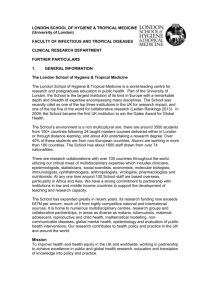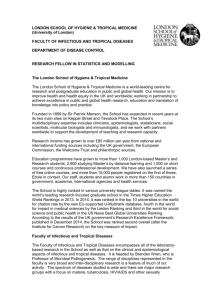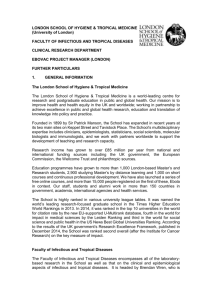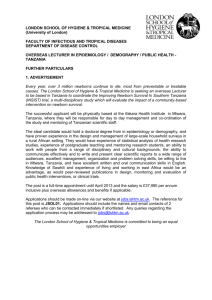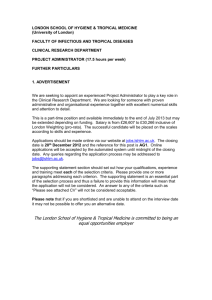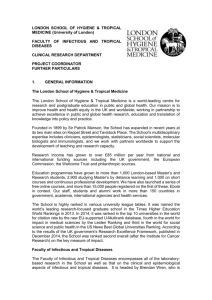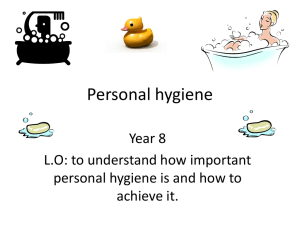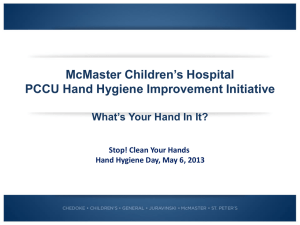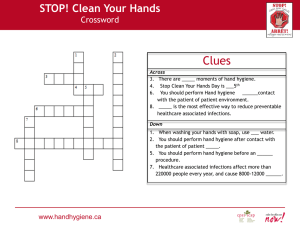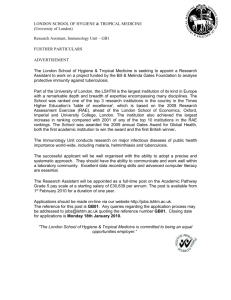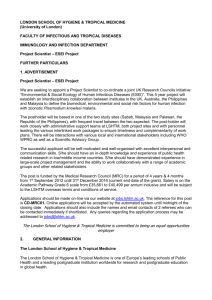Jobs at LSHTM - London School of Hygiene & Tropical Medicine
advertisement
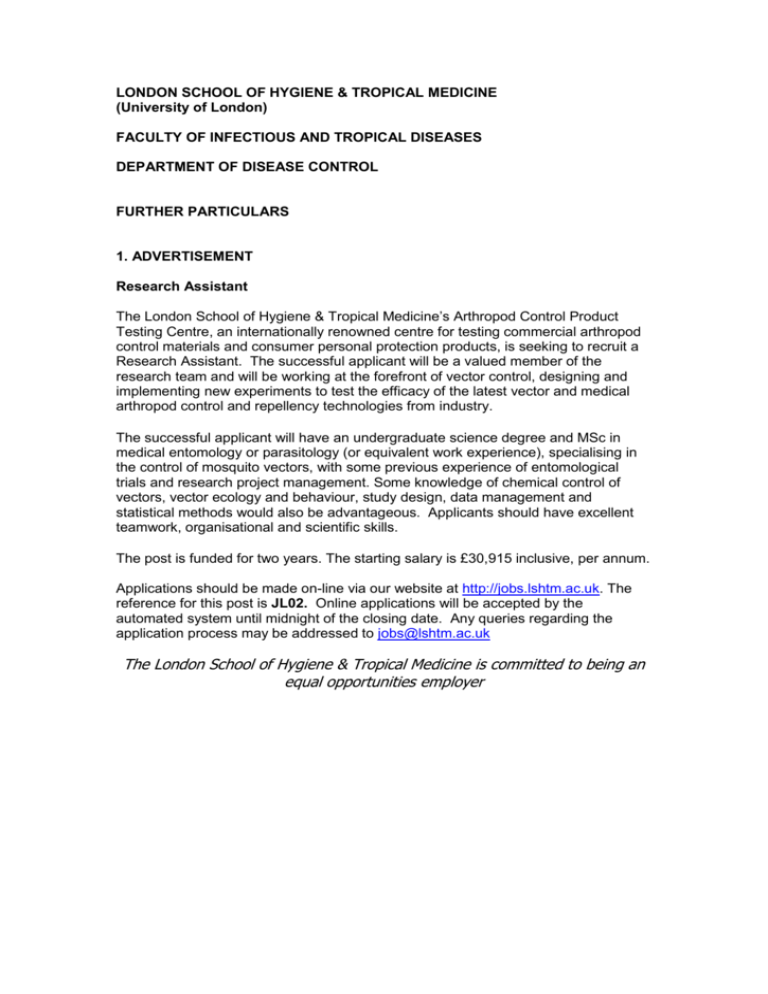
LONDON SCHOOL OF HYGIENE & TROPICAL MEDICINE (University of London) FACULTY OF INFECTIOUS AND TROPICAL DISEASES DEPARTMENT OF DISEASE CONTROL FURTHER PARTICULARS 1. ADVERTISEMENT Research Assistant The London School of Hygiene & Tropical Medicine’s Arthropod Control Product Testing Centre, an internationally renowned centre for testing commercial arthropod control materials and consumer personal protection products, is seeking to recruit a Research Assistant. The successful applicant will be a valued member of the research team and will be working at the forefront of vector control, designing and implementing new experiments to test the efficacy of the latest vector and medical arthropod control and repellency technologies from industry. The successful applicant will have an undergraduate science degree and MSc in medical entomology or parasitology (or equivalent work experience), specialising in the control of mosquito vectors, with some previous experience of entomological trials and research project management. Some knowledge of chemical control of vectors, vector ecology and behaviour, study design, data management and statistical methods would also be advantageous. Applicants should have excellent teamwork, organisational and scientific skills. The post is funded for two years. The starting salary is £30,915 inclusive, per annum. Applications should be made on-line via our website at http://jobs.lshtm.ac.uk. The reference for this post is JL02. Online applications will be accepted by the automated system until midnight of the closing date. Any queries regarding the application process may be addressed to jobs@lshtm.ac.uk The London School of Hygiene & Tropical Medicine is committed to being an equal opportunities employer 2. GENERAL INFORMATION The London School of Hygiene & Tropical Medicine The London School of Hygiene & Tropical Medicine is one of Europe’s leading Schools of Public Health and a leading postgraduate institution worldwide for research and postgraduate education in global health. Part of the University of London, the London School is the largest institution of its kind in Europe with a remarkable depth and breadth of expertise encompassing many disciplines. The School was ranked one of the top 3 research institutions in the country in the Times Higher Education’s 'table of excellence', which is based on the 2008 Research Assessment Exercise (RAE), ahead of the London School of Economics, Oxford, Imperial and University College, London. The institution also achieved the largest increase in ranking compared with 2001, of any of the top 10 institutions in the RAE rankings. In 2009, the School became the first UK institution to win the Gates Award for Global Health. The School’s environment is a rich multicultural one: there are almost 4000 students from 100+ countries following 22 taught masters courses delivered either in London (~650) or through distance learning (~2700), and undertaking research degree training (~400). Over 40% of these students are from non-European countries. The largest growth has been in distance learning students (>40% over 3 years), though the London-based student population (where accommodation limits growth) is at its highest level ever. Alumni are working in more than 180 countries. The School has about 1400 staff drawn from over 60 nationalities. There are research collaborations with over 100 countries throughout the world, utilizing our critical mass of multidisciplinary expertise which includes clinicians, epidemiologists, statisticians, social scientists, molecular biologists, immunologists, ophthalmologists, anthropologists, virologists, pharmacologists and nutritionists. At any one time around 100 School staff are based overseas, particularly in Africa and Asia. We have a strong commitment to partnership with institutions in low and middle income countries to support the development of teaching and research capacity. The School has expanded greatly in recent years. Its research funding now exceeds m£62.4 per annum, much of it from highly competitive national and international sources. The commitment of staff to methodological rigour, innovative thinking and policy relevance will ensure that the School continues to occupy a leadership position in national and global health, adapting quickly to new challenges and opportunities. Mission The School's mission is to contribute to the improvement of health worldwide through the pursuit of excellence in research, postgraduate teaching and advanced training in national and international public health and tropical medicine, and through informing policy and practice in these areas." Faculty of Infectious and Tropical Diseases The Faculty of Infectious and Tropical Diseases encompasses all of the laboratorybased research in the School as well as that on the clinical and epidemiological aspects of infectious and tropical diseases. It is headed by Simon Croft, who is Professor of Parasitology. The range of disciplines represented in the faculty is very broad and inter-disciplinary research is a feature of much of our activity. The spectrum of diseases studied is wide and there are major research groups with a focus on malaria, tuberculosis, HIV/AIDS and other sexually transmitted diseases, vaccine development and evaluation, and vector biology and disease control. The Faculty is organised into four large research departments comprising: Pathogen Molecular Biology, Immunology and Infection, Disease Control, and Clinical Research. There is close interaction between scientists in different research teams. The Faculty has strong overseas links, which provide a basis for field studies and international collaborations in developed and developing countries. The teaching programme includes MSc courses, taught in-house and by distance learning, which are modular in structure, a variety of short-courses and an active doctoral programme (PhD and DrPH). Department of Disease Control (Head: Dr Mark Rowland) This multidisciplinary Department includes epidemiologists, entomologists, anthropologists and social scientists, clinical scientists, public health engineers, and geographers. This range of expertise provides us with a battery of tools for focusing on the control of diseases that are insect-borne, water-borne or associated with poor hygiene – mostly in developing countries. Much of the research can be categorised as: evaluating disease control interventions; investigating implementation strategies including working with the private sector; understanding the factors underlying household behaviour in relation to family health; or determining how control resources can be targeted most efficiently. Particular attention is paid to research directed at current health policy issues, including the gap between policy and practice. The DFID Resource Centre for Water and Environmental Health (WELL) and the Hygiene Centre make up the Department’s Environmental Health Group, which plays a leadership role in research and operational support for hygiene promotion, water supply and sanitation. The Department also houses the largest research group in LSHTM working on malaria control, including the DIFD Team for Applied Research to Generate Effective Tools and Strategies for communicable disease control (TARGETs) and the Malaria Capacity Development Consortium (MCDC). The Department’s valuable mosquito colonies are used for testing repellent products and insecticides in the laboratory. The Department also includes a major grouping of researchers using spatial analysis in public health. Teaching The School offers 22 one year full-time taught courses leading to the Master of Science (MSc) degree of the University of London and the Diploma of the London School of Hygiene and Tropical Medicine (DLSHTM). The Faculty of Infectious and Tropical Diseases runs or contributes substantially to ten of these courses and the “Immunology of Infectious Diseases” course is run from within the Department of Immunology and Infection. In addition, the Faculty is responsible for the three-month Diploma in Tropical Medicine and Hygiene (DTM&H) and offers a range of specialist short courses lasting usually one or two weeks. Three MSc courses are also offered by Distance-based Learning, including one on Infectious Diseases. Teaching requirements For research assistants and research fellows: To contribute to the Faculty teaching programme, up to 10% of your time per annum, subject to the policy of any funding agency (by agreement, some staff may make a greater contribution than this). Research Training The School offers two doctoral training programmes. The MPhil/PhD degrees are designed for those who wish to go on to a full time research career. The DrPH is directed towards those who expect their careers to be more in the practice of public health. 3. JOB DESCRIPTION Post: Research Assistant Grade: AP5 Responsible to: Dr James Logan Department: Department of Disease Control The post-holder will be responsible to the Principal Investigator, Dr James Logan, and will be required to design and implement scientifically rigorous experiments to test the efficacy of arthropod control products following WHO protocols in laboratory experiments. The post-holder will also perform data analysis and interpretation and may at times be required to assist in other research activities within the research group. The majority of the tests will be done for industrial clients and therefore, an essential component of the post will be to liaise effectively with requests for information from industry when required. The post requires an enthusiastic, organised and innovative individual with a good experimental mind and excellent attention to detail. Main duties and responsibilities: Design, preparation and implementation of experiments to test products designed for arthropod control or personal protection Data entry, statistical analysis and interpretation of data Assist in preparation of reports and quotations Handle confidential information Respond to enquiries from clients Liaise with industrial partners and clients, administrative and support staff, overseas field laboratories and insectary staff Insect rearing when required General laboratory duties, including preparation of chemicals, sourcing of materials and equipment for experiments, etc Contribute to writing of scientific manuscripts Assist with other administrative and research activities where required 4. PERSON SPECIFICATION Essential Science degree and MSc in Entomology (or related discipline) or equivalent work experience Excellent written and oral communication skills Proven ability to juggle a high and varied workload to a high degree of accuracy Proven ability to perform statistical analysis on biological data Proven ability to work as a team player Excellent IT skills including use of Microsoft desktop applications, including Microsoft Word and Excel, and statistical software A high degree of personal motivation, including the ability to work independently and organize own priorities Desirable 5. Experience and knowledge of dealing with companies/private sector organisations Experience and knowledge of WHOPES testing procedures Experience in vector control Experience of rearing insects SALARY AND CONDITIONS OF APPOINTMENT The post is funded for a period of two years. The starting salary is £30,915 inclusive, per annum. Annual leave entitlement is 30 working days per year for all staff (pro-rata for part-time staff). In addition to this there are 6 fixed-date "Director's Days". 6. APPLICATIONS Applications should be made on-line via our website at http://jobs.lshtm.ac.uk. The reference for this post is JL02. Applications should also include the names and email contacts of 2 referees who can be contacted immediately if shortlisted. Any queries regarding the application process may be addressed to jobs@lshtm.ac.uk. The supporting statement section should set out how your qualifications, experience and training meet each of the selection criteria. Please provide one or more paragraphs addressing each criterion. The supporting statement is an essential part of the selection process and thus a failure to provide this information will mean that the application will not be considered. An answer to any of the criteria such as “Please see attached CV” will not be considered acceptable. Please note that if you are shortlisted and are unable to attend on the interview date it may not be possible to offer you an alternative date. The London School of Hygiene & Tropical Medicine is committed to being an equal opportunities employer.
